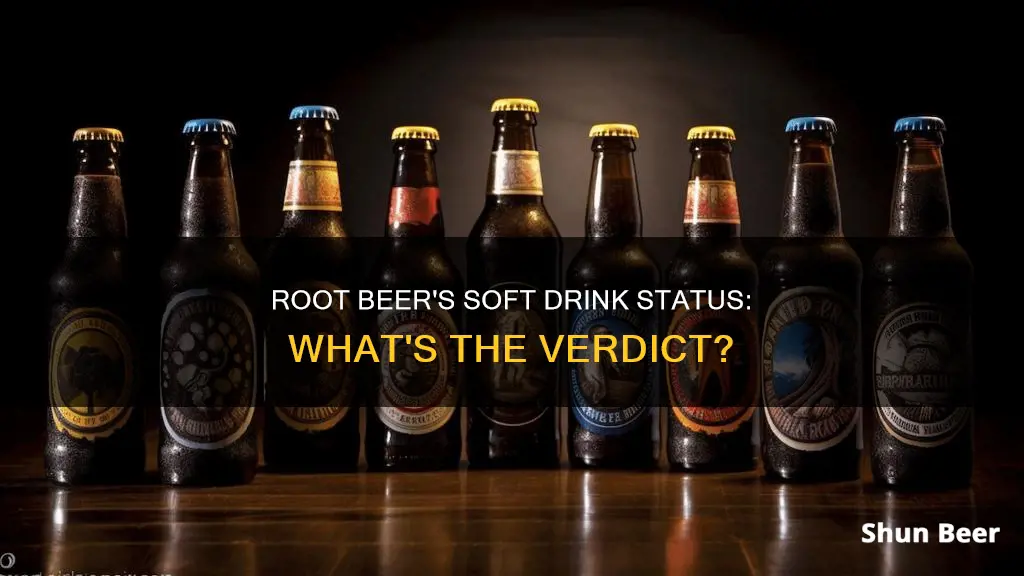
Root beer is a sweet, carbonated, non-alcoholic drink commonly flavoured with extracts of roots and herbs. It is considered a soft drink, which is defined as any non-alcoholic beverage, usually but not necessarily carbonated, and typically containing a sweetener, edible acids, natural or artificial flavourings, and sometimes juice. Soft drinks are distinct from coffee, tea, milk, cocoa, and undiluted fruit and vegetable juices. Root beer was first marketed and sold on a mass scale by pharmacist Charles Hires in the late 1800s, and it has since become heavily ingrained in American culture.
| Characteristics | Values |
|---|---|
| Carbonation | Carbonated |
| Alcohol Content | Alcohol-free |
| Sweetness | Sweet |
| Ingredients | Sassafras, sarsaparilla, wintergreen, birch, juniper, hops, vanilla, nutmeg, cinnamon, clove, honey, etc. |
| Calories | High-calorie |
| Caffeine | Caffeine-free |
What You'll Learn

Root beer's history
Root beer is a sweet, carbonated soft drink with a distinctive flavour. Its history is long and varied, with roots in indigenous North American culture.
Indigenous peoples of North America brewed medicinal teas and tinctures from roots, barks, berries, and flowers. Some of these drinks used sassafras, wintergreen, and sarsaparilla—plants thought to boost immune function, reduce inflammation, and combat allergies. These drinks were not recreational; they often tasted unpleasant and could have harmful side effects if overused. Sassafras, for example, was known to cause liver damage in large quantities.
When European colonists arrived in the Americas, they brought with them the tradition of "small beer". These were low-alcohol beers (around 1-2% ABV) that were safer to drink than water, cheap, and unlikely to intoxicate. Colonists observed indigenous people using plants like sassafras and sarsaparilla and began brewing their own small beers with these ingredients, naming them "root beers".
In the early days of the United States, root beer was sold in small shops and drugstores but was largely considered a niche health drink. This changed in the 1870s, thanks to Philadelphia pharmacist Charles Elmer Hires. Hires obtained a recipe for root beer from an innkeeper's wife during his honeymoon and, upon his return, asked local college professors to help him adjust the recipe for commercial production. The professors formulated a way to turn the ingredients into a shelf-stable powder and eliminated the strong laxative effect of the original recipe. Hires, a teetotaler, began marketing his "powder root tea" to coal miners and, on the advice of a friend, renamed it "root beer". The drink was an instant commercial success.
In the late 19th and early 20th centuries, several other brands of root beer emerged, including Barq's (1898), A&W (1919), and IBC (1919). Root beer's popularity exploded during Prohibition and it continued to grow throughout the 20th century.
In 1960, the U.S. Food and Drug Administration banned safrole, the aromatic oil in sassafras, due to its potential to cause liver damage and cancer. As a result, most producers began using a safrole-free sassafras extract.
Beer and Lorazepam: Safe Mix or Risky Cocktail?
You may want to see also

Is root beer alcoholic?
Root beer is a sweet soft drink that has been consumed in the US since at least the 18th century. It was initially brewed with ingredients like sassafras root bark and dandelion root, and was consumed as an alternative to beer. In fact, it was also referred to as "root tea" before it was marketed as "root beer" to appeal to Pennsylvanian coal miners.
Root beer is typically non-alcoholic, caffeine-free, sweet, and carbonated. However, traditionally, it was made through fermentation, which resulted in an alcohol content of about 2%. The recipe could be modified to produce a more alcoholic beverage.
Today, most root beer is non-alcoholic and commercially produced, with major producers including PepsiCo, Coca-Cola Company, Dad's, Keurig Dr. Pepper, and A&W. However, some breweries still make alcoholic root beer with a small percentage of alcohol, usually below 5%. These alcoholic versions are typically sold in liquor stores, speciality beer shops, and some supermarkets.
So, while most root beer today is non-alcoholic, there are some alcoholic versions available, and traditionally, root beer was fermented and had a small amount of alcohol.
Breastfeeding and Non-Alcoholic Beer: What's Safe to Drink?
You may want to see also

Root beer ingredients
Root beer is a sweet, carbonated soft drink that is typically non-alcoholic and caffeine-free. Its primary flavour usually comes from the root bark of the sassafras tree, or the vine of the sarsaparilla plant. However, since safrole, a key component of sassafras, was banned by the U.S. Food and Drug Administration in 1960 due to its carcinogenicity, most commercial root beers use artificial sassafras flavouring or a safrole-free sassafras extract.
Root beer was originally made with a variety of ingredients, including sassafras root and bark, sarsaparilla, birch bark, licorice, hops, vanilla, burdock root, dandelion root, coriander, cherry bark, and guiacum gum. These ingredients were often brewed into hot teas or cooked into a syrup, which was then fermented to create a slightly alcoholic beverage.
Today, modern mass-produced root beer is typically made with carbonated water, sugar or high-fructose corn syrup, and caramel colouring, in addition to natural and artificial flavourings. Some common flavourings include vanilla, caramel, wintergreen, black cherry bark, licorice root, sarsaparilla root, nutmeg, acacia, anise, molasses, cinnamon, sweet birch, and honey.
- 1 cup fresh sassafras roots, or 1/2 cup dried sassafras roots, or a combination of 1/4 cup sassafras and 1/4 cup sarsaparilla
- 1/2 cup finely chopped burdock root and/or dandelion root
- 1 star anise, or 1/2 tsp anise seeds, or 1/2 tsp fennel seeds, or 1 tsp licorice root
- 1 tsp coriander seeds, or 4 crushed allspice berries, or 6 crushed spicebush berries
- 1/2 cinnamon stick, or 1/4 tsp ground cinnamon
- Extra-strength: 2 drops of wintergreen or peppermint extract
- 1/4 cup light molasses
- 6 cups of cane sugar
- 2 quarts of carbonated soda water, or a pinch of yeast
To make root beer, these ingredients are simmered in water to create a tisane, to which sugar is added to create a syrup. This syrup can then be diluted with soda water to make a non-alcoholic root beer, or fermented with yeast to create a slightly alcoholic version.
Cialis and Beer: A Safe Mix?
You may want to see also

Root beer's popularity
Root beer is a soft drink, or soda, that is particularly popular in the United States. It is also available in other countries, such as the United Kingdom, Australia, and New Zealand, although it is not as popular. In Australia and New Zealand, a similar drink called sarsaparilla is sold instead of root beer.
Root beer is a sweet, carbonated drink with a unique flavour derived from roots and herbs. It is often described as tasting like anise or liquorice, with a slight bitterness. Some people also detect notes of cinnamon, clove, nutmeg, vanilla, or wintergreen.
The drink is believed to have been founded by Native Americans before arriving in Europe, and it has been a prominent part of American culture since the 19th century. It has been sold in stores since the 1840s, and recipes have been documented since the 1860s. In 1875, the first commercial brand of root beer, Hires Root Beer, was introduced by Charles Elmer Hires. Hires, who did not drink alcohol, marketed root beer as an alternative to alcoholic beverages, particularly for coal miners in Pennsylvania.
Today, root beer remains a popular soft drink option in the United States, with several brands available, including A&W, Mug, Barq's, and Dr. Brown's. It is often enjoyed on its own or paired with food, such as burgers, sandwiches, or ice cream (in the form of a root beer float).
Beer and Painkillers: How Does Ibu Work?
You may want to see also

Root beer alternatives
Root beer is a type of soft drink. It is carbonated and usually sweet, and it can be made and enjoyed at home.
Sarsaparilla
Sarsaparilla is very similar to root beer. In fact, some say that root beer is just an 'adulterated sarsaparilla' due to its mix of flavour-enhancing ingredients. While sarsaparilla was traditionally made from the sarsaparilla root alone, root beer was made from the roots of the sassafras tree. However, sassafras is no longer used in root beer recipes due to its links to serious health issues. Despite this difference in ingredients, the two drinks are often confused. In Australia and New Zealand, for example, you will find Bundaberg Sarsaparilla on supermarket shelves, while in America and the UK, the same product is labelled as Bundaberg Root Beer.
Ginger Ale
Ginger ale is another alternative to root beer. It can be made at home by substituting two tablespoons of grated fresh ginger and two tablespoons of lemon zest and lemon juice for the root beer herbs in the recipe.
Cream Soda
Cream soda is another option for those looking for a root beer alternative. It can be made by substituting half a cup of crushed strawberries and raspberries for the root beer herbs in the recipe.
Homemade Root Beer
For those who want to avoid the high levels of sugar, chemicals and preservatives in commercial root beer, it is possible to make a healthier version at home. Traditional root beer was created by a pharmacist as an energy tonic, and when made with herbs, it is healthy, tonic and energising.
Beer and Eliquis: A Safe Mix?
You may want to see also
Frequently asked questions
Yes, root beer is a sweet, carbonated, non-alcoholic drink, which is a type of soft drink.
Root beer is commonly made from the roots of the sassafras tree, but it can also be made from sarsaparilla, wintergreen, birch, juniper, and other natural flavourings.
Root beer and sarsaparilla are different drinks with distinct histories, but they share very similar ingredients and have a similar taste. In some places, like Australia and New Zealand, the same drink is sold under two different names.
Yes, root beer is heavily ingrained in American culture and is usually available at most supermarkets. It is produced by major American brands such as PepsiCo, Inc. and The Coca-Cola Company.







